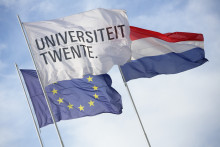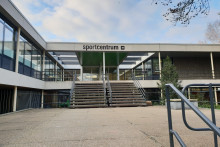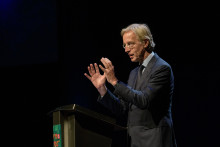The European elections of Thursday 6 June are about a whole range of topics, all of them very important: economy, defence, climate change, migration, the fight against fake news... There are all kinds of election websites, such as Stemwijzer, Kieskompas and YoungVoice.
But what about education and research in Europe? Amongst other things, the parties have an influence on the Erasmus+ exchange programme and on the EU budget for research and innovation.
PVV
The largest party in the Netherlands doesn’t say anything about education and research in its concise election programme, but the budget for the European Union must come down. This almost certainly means cuts in research, as PVV is not planning on reducing agricultural expenditure.
It is generally known that the party wants to strongly limit the intake of foreign students. On welcoming skilled migrant workers, the party says the following in the Stemwijzer: 'The Netherlands is bursting at its seams.' Even if the shortages in the labour market increase, the party won’t allow them in.
Study-related migration
Other parties also want to limit study-related migration and write this explicitly. NSC, for example: 'We limit the number of EU students doing a full-time programme at Dutch institutions.' Amongst other things, the party wants to change the rules, 'so it’s less easy for EU students to be entitled to student financing in the Netherlands'.
BBB and VVD feel the same way. The number of arriving and departing students should be in balance, thinks BBB. VVD acknowledges that foreign students 'contribute to knowledge and revenues', but also thinks the intake is 'too big and unfocused' and criticises the shortages in student housing and the overfull lecture halls.
Not all the parties devote the same amount of attention to it in their campaigns, but JA21, CDA, SGP and SP have similar views. ChristenUnie is a bit less strict, but does want to have a 'critical look' at study-related migration.
Volt, on the other hand, has a completely different approach. The pro-European party aspires to a socially united Europe that 'celebrates cultural differences and facilitates mobility' across borders. Education should include 'democratic thinking, media literacy and critical thinking'.
GroenLinks-PvdA and D66 also praise the mutual recognition of diplomas and certificates within the EU, so you can easily study and work in another country. D66 emphasises once again that internationalisation of higher education offers many advantages, 'for students themselves, for the education institutions and for the host country'. But some countries, the democratic party feels, are getting so popular that the pressure is becoming excessive, so more of a balance should be created.
Erasmus+
Studying in Barcelona or Rome for a while? Everyone’s fine with that. Exchange is different from migration, almost all parties agree. NSC, for example, writes in its election programme: 'It is very good to spend a semester or academic year in another EU country.'
In other words, Erasmus+ is popular amongst politicians from left to right. CDA wants to make the exchange programme more accessible to students in intermediate and higher vocational education. GroenLinks-PvdA wants to raise the grant 'to give everyone the opportunity to benefit from this valuable initiative'. D66 even wants researchers and teachers to also be able to go on exchanges through Erasmus+. Volt wants to increase the budget of the programme. VVD is particularly happy when Dutch students use it to go abroad.
More money for research
A few parties want to spend more money on European research. GroenLinks-PvdA, for example, wants to shift part of the agriculture budget to research. Volt even wants to triple the European research programme Horizon and D66 and NSC also want Europe to spend more money on research.
Other parties do not speak out clearly on the subject. The fight for the EU budget is sometimes summarised as ‘knowledge or cattle’. In other words, should the EU foster a knowledge economy at the expense of agricultural subsidies or not? Incidentally, the Netherlands receives a relatively large sum of money from the EU budget for research.
Wishes for research
Almost all parties do have ideas on themes on which more research should be conducted. NSC, for example, supports a European knowledge centre on nuclear energy. JA21 also wants this to be researched. On top of this, VVD, NSC and BBB provide a lot of space to innovation in the area of defence.
CDA mentions health and water quality as research priorities, while Partij voor de Dieren is mostly focusing on sustainable energy. The latter is supported by everyone, including polar opposite BBB. BBB also thinks scientists should devote attention to agriculture and food.
As far as D66 is concerned, ‘open science’ is to become the standard in Europe: the outcomes of publicly funded research must be freely accessible to everyone and not end up behind a pay wall. Partij voor de Dieren and GroenLinks-PvdA also explicitly mention open science. That is not to say the rest is against it. VVD, for instance, has been a great advocate of the transition to open science here in the Netherlands.
Lab animals
It goes without saying that lab animals are a priority area for Partij voor de Dieren. 'Europe must lead the way in research without animal testing', the party feels. 'Millions of lab animals are still in cages for research. This causes great animal suffering and death.' This should be over by 2030 at the latest.
SP has similar views. 'Through the development of alternative testing methods, using lab animals will become unnecessary over time', is the goal.
GroenLinks-PvdA and VVD also call for research without lab animals. They want to permit animal testing for now, but only if it’s the only way to achieve an improvement of public health. For GroenLinks-PvdA, this is the first step towards a world without animal testing.
There are plenty of European election programmes that don’t feature the subject, although parties do have an opinion on it. D66 and SGP, for example, do mention it in Dutch elections.
No Denk, no FvD
Denk is not taking part in the European elections. Forum voor Democratie wants to leave the European Union and says little about education and research in its election programme.








